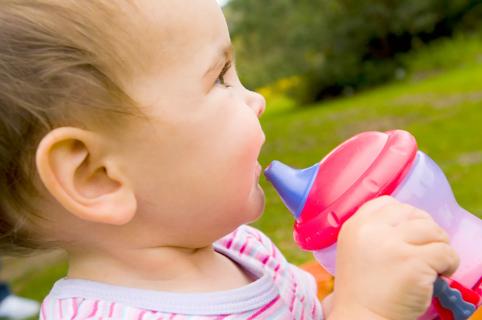Most babies can start with formula made from cow’s milk or soy

A trip down the baby formula aisle at the store is enough to make any parent’s head spin. Why are there so many different kinds? And you thought choosing your baby’s name was tough.
Advertisement
Cleveland Clinic is a non-profit academic medical center. Advertising on our site helps support our mission. We do not endorse non-Cleveland Clinic products or services. Policy
Don’t panic — picking your baby’s formula doesn’t have to give you a headache. Pediatrician and internal medicine physician Matthew Badgett, MD, explains the different formula types and how to choose the right one for your baby.
All U.S. Food and Drug Administration (FDA)-approved infant formula contains the nutrients that newborns and infants need to thrive. Protein, carbohydrates and fat are in specific proportions that closely resemble human breast milk.
“All infant formulas must meet requirements that ensure optimal nutrition for babies,” Dr. Badgett says. “If your baby’s formula is sold in the U.S., it has the nutrients your baby needs.”
But what about all those extras listed on the package, like probiotics or brain health ingredients? “There’s no data to show that these extra ingredients will make your baby healthier,” Dr. Badgett says. “Your baby can thrive on a basic formula without those extra claims.”
Although all formulas are tested for safety, your baby might need a specific type if they have allergies or other health issues. There are many brands, but all formulas fit into one of these categories:
About 80% of formulas on the market are made from cow’s milk, and most babies do well with this type.
Advertisement
“Baby formula made from cow’s milk isn’t the same as the milk you buy in the dairy section,” Dr. Badgett explains. “Regular cow’s milk is harder for babies to digest and doesn’t contain the exact balance of nutrients they need. Cow’s milk formula is specially processed to make it safe and healthy for full-term newborns and infants.”
The first ingredient in cow’s milk formula is usually listed as “nonfat milk.” Its other ingredients include:
Many parents worry that the lactose in cow’s milk formula will cause tummy problems or gas, but this usually isn’t the case. While many people have lactose intolerance, or trouble digesting lactose, this condition is uncommon in newborns.
“People usually develop lactose intolerance after age 3,” Dr. Badgett notes. “Most babies easily digest cow’s milk formulas, even though they’re high in lactose. In fact, human breast milk is usually higher in lactose than cow’s milk formulas.”
Most healthy babies can safely start with cow’s milk formula unless your pediatrician advises against it. You might need to avoid cow’s milk formula if your baby is premature (born before 37 weeks) or has:
Like cow’s milk formula, soy formula also contains the optimal levels of protein, fat and carbs. Soy formula is naturally vegan and lactose-free. It contains:
Soy naturally contains phytoestrogens, plant compounds that look like the hormone estrogen. But that doesn’t make soy unsafe or any worse than cow’s milk formula.
“There’s no evidence to suggest that soy phytoestrogens are unhealthy for babies,” Dr. Badgett states. “In fact, phytoestrogens appear to reduce cancer risk in the long run. And you can’t avoid estrogen, either. Your baby will get estrogen from cow’s milk formula or human breast milk, too. And that’s OK.”
Soy formula may also be a good option if your baby is allergic to cow’s milk. Soy formula is dairy-free and usually costs less than hypoallergenic formula.
“Many babies with cow’s milk allergy tolerate soy formula,” Dr. Badgett says. “But if your baby is allergic to both cow’s milk and soy, you’ll need a hypoallergenic formula.”
Advertisement
If your baby has tummy trouble from cow’s milk formula, then partially hydrolyzed formula might be the answer. Often labeled as “gentle,” these cow’s milk formulas are easier for babies to digest. This is because the partially hydrolyzed proteins in the formula are broken down into smaller pieces.
You can tell if a formula is partially hydrolyzed by looking at the label. The ingredients will list “partially hydrolyzed” before the protein name, which will be whey or casein. This type of formula isn’t safe for babies with a cow’s milk allergy.
“Partially hydrolyzed formulas can be helpful if your baby is very fussy, gassy or colicky,” Dr. Badgett says. “Babies with eczema may also benefit from this type. But before you switch to partially hydrolyzed formula, talk with your pediatrician. Your baby’s fussiness or colic could be due to another factor that we need to address.”
Extensively hydrolyzed or hypoallergenic formula is designed for babies with cow’s milk and soy allergies. These formulas are made from cow’s milk, but are safe for babies who are allergic to cow’s milk. How? The proteins are broken down so small that their body doesn’t recognize them as cow’s milk protein.
“Most babies don’t need extensively hydrolyzed formula, so only use this kind if your pediatrician recommends it,” Dr. Badgett advises. “It’s not healthier or better for babies without allergies, and it costs more.”
Advertisement
Only your baby’s healthcare provider can diagnose a cow’s milk allergy, but possible signs include:
“Spitting up concerns many parents, but it doesn’t indicate an allergy,” Dr. Badgett says. “All babies spit up. If your baby is growing normally and their stools are soft, they probably don’t have an allergy to their formula.”
If your baby was born prematurely, your pediatrician may recommend a neonatal formula. Neonatal formulas are designed to help babies who were born prematurely to grow and thrive. This type is usually fed to babies in neonatal intensive care units (NICUs).
“Formulas for babies who are premature are higher in certain nutrients than standard baby formulas,” Dr. Badgett explains. “They’re also designed to work well with their immature stomach and kidneys, which usually cannot handle standard formula.”
Talk to your pediatrician about neonatal formula, and how long your baby may need it. Once your baby has matured enough, you may be able to switch to a standard formula.
Toddler formulas are designed for babies older than 12 months.
“You can use toddler formula to supplement your baby’s solid food diet after their first birthday,” Dr. Badgett says. “But don’t give toddler formula to newborns or infants. It doesn’t have the right balance of protein, fat and carbs your baby needs during their first year.”
Advertisement
Toddler formula isn’t a necessity for your older baby. Most babies can switch to whole milk or unsweetened soy milk at 12 months.
Once you’ve figured out the type of formula you need, you have another decision to make. Powdered, concentrate or ready-to-feed?
“Powdered formula tends to be less expensive, and work well for most babies,” Dr. Badgett states. “If your baby is premature or has a weakened immune system, your pediatrician may recommend liquid. In rare cases, powdered formula can have germs that can make immunocompromised babies sick. But for all other babies, this is not a concern, and powdered formula is a safe option.”
If your baby doesn’t have allergies or special health needs, it’s fine to switch brands or types of formula. If your baby seems to have colic or gas, talk to your pediatrician about formula options for gassiness.
“Many parents think that a fussy baby needs a different formula,” Dr. Badgett notes. “But before you switch, speak with your provider about your baby’s symptoms. Sometimes, your baby needs a different formula, but other times, it’s just a developmental stage your baby is going through.”
If you’re breastfeeding and supplementing with formula, the advice above still pertains to you, too.
“You don’t need to use a special type of formula for supplementation,” Dr. Badgett says. “The same rules apply to babies fed exclusively formula and babies who get some human breast milk.”
Human breast milk or formula is the bulk of your baby’s diet for their first year of life. After you choose the type, you need to know how to feed it to your little one. Also, make sure you know how to prepare and store your baby’s formula.
When you give your baby a bottle:
Yes, the sheer number of formulas can be overwhelming at first. But most babies do well with a basic cow’s milk or soy formula. If your baby shows signs of colic or an allergy, talk with your pediatrician. Together, you can discuss switching to a partially or extensively hydrolyzed option.
“You usually don’t need the most expensive formula to have a healthy, happy baby,” Dr. Badgett says. “Choose a formula that fits your baby’s health needs. If your baby is growing and thriving, you chose the right one.”
Learn more about our editorial process.
Advertisement

In babies under 12 months old, cow’s milk has been associated with gastrointestinal bleeding

No juice until your child is 1 year old — and even then, they shouldn’t have much, if any

Ultimately, the choice depends on what works best for you and your baby, but it’s also important to be aware of the pros and cons of both

Ideally, you want your toddler to be drinking from a ‘big kid cup’ by age 2

Letting your baby feed themself foods the whole family enjoys has its benefits — but stick to softer foods and follow safe-eating guidelines

Levels are generally low, but there are ways to minimize potential health risks

Slowly introducing cow’s milk (or soy milk) can help your child make the change

In babies under 12 months, honey may cause a serious illness called infant botulism

Wearing a scarf, adjusting your outdoor activities and following your asthma treatment plan can help limit breathing problems

Your diet in the weeks, days and hours ahead of your race can power you to the finish line

When someone guilt trips you, they’re using emotionally manipulative behavior to try to get you to act a certain way